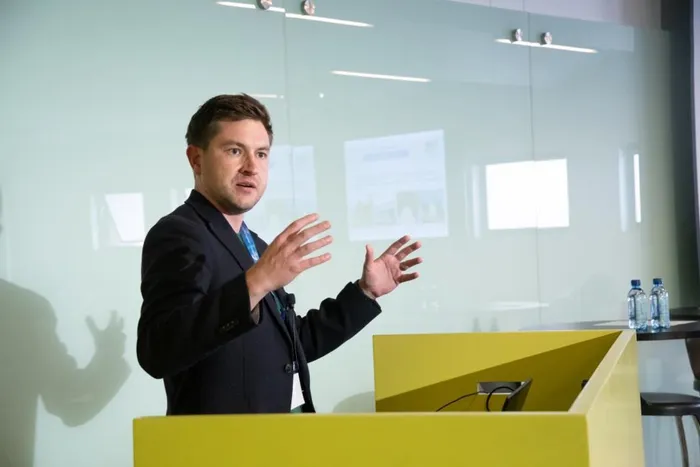UP, Tshwane partner to develop solutions to real-world issues facing city

Cilliers Brink, City of Tshwane Executive Mayor, engages academics at the University of Pretoria. Supplied
THE City of Tshwane and the University of Pretoria (UP) have added another level to their strategic partnership with an initiative which aims to bridge the gap between academia and public policy.
The initiative will help to address some of the City’s most pressing challenges through research collaboration between academics and local officials.
The two entities recently hosted the first of a planned regular series of workshops between UP’s Public Policy Hub, based in the Faculty of Economic and Management Sciences, and the City of Tshwane’s Policy Development Support Committee.
The City’s Policy Development Support Committee plays a critical role in fostering transformative and evidence- based research that influences policy, and it will act as an initial vetting body before policies are escalated for consideration by the mayoral committee.
Its overarching objective is to elevate the quality and applicability of policy documents in order to help the CoT improve innovation, user-centricity and operational efficiency.

“As government, we do not have all the answers and, in fact, in many instances we have run out of answers,” said Cilliers Brink, City of Tshwane Executive Mayor.
“We want to work with the University of Pretoria to leverage on their intellectual resources to solve burning issues like getting our streets cleaned, coping without landfills, improving transport mobility, and simplifying the process of finding and providing dwelling for people in the City of Tshwane. As seen in the census results, Tshwane is the metropolitan municipality with the highest number of people living on the streets in the country.”
Brink added that good action on policy might mean getting rid of certain policies “that stand in the way of progress. It might also mean reducing the number of policies or change some policies, but I must say, we are not moving away from policy.
“Policy is important because it gives us an opportunity to do certain tests, collect evidence and decide on the best way to solving a problem in a sustainable manner. We want to make sure we have the right policies in place, because the usefulness of a policy is gauged by whether or not it can be implemented and used to solve a problem.”
Professor Margaret Chitiga-Mabugu, Dean of UP’s Faculty of Economic and Management Sciences, said the partnership aligns with the institution’s commitment to transforming its cutting-edge research into actionable policies and practical solutions while fulfilling the University’s institutional mission of community engagement, social responsibility and civic commitment.
“We are at a juncture where we have the opportunity to create a symbiotic relationship that goes beyond traditional partnerships,” Chitiga-Mabugu added.
“A relationship where the City benefits from evidence-based research for policy development and the University gains access to real-world challenges that serve as fertile ground for academic inquiry and thus publications. As [British author and journalist] Christopher Hitchens wisely stated, ‘What can be asserted without evidence can be dismissed without evidence.’
“Therefore, this collaboration offers UP and the metro an invaluable opportunity to deepen the approach of grounding its policies in rigorous research.”
She urged the mayor and his team to take full advantage of UP’s academic infrastructure, which includes a multitude of institutes, units and centres with expertise that can help solve community challenges through research-driven policy development, implementation and evaluation.
She said UP staff and students will benefit from the partnership through access to information and invaluable data that can significantly enrich UP’s research initiatives; interdisciplinary collaboration; postgraduate student engagements; and scholarly impact through the publication of research articles.
“This workshop is not just an event but the initiation of a journey where academic scholarship and public service converge to co-create a sustainable, more equitable future for all.
“To all my UP colleagues, postgraduate students and future scholars: your active participation is the cornerstone of this ambitious initiative. It is only through your active engagement that we can fully harness the power of our research-intensive university to benefit the City of Tshwane and our community,” Chitiga-Mabugu added in her closing remarks.
Pretoria News
Related Topics: